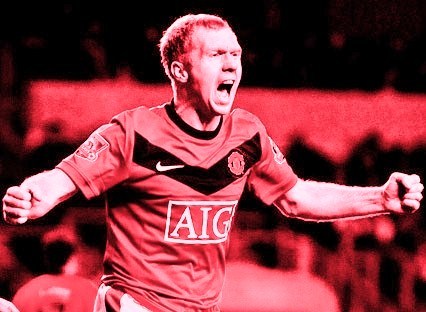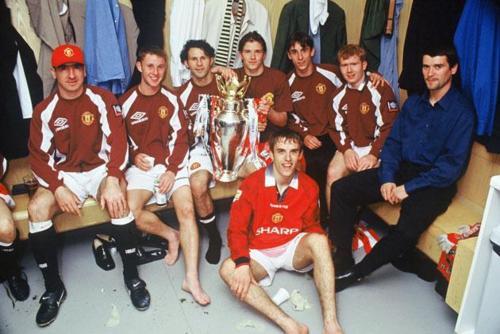The Ginger Prince
The Ginger Prince

“I am not a man of many words, but I can honestly say that playing football is all I have ever wanted to do” - departing words from one of football’s understated legends. Another member of United’s class of ‘92 announced his retirement today, lowering the curtain on an illustrious career with tons of trophies, but sparing individual honors. Paul Scholes would probably have it no other way.
He was never one for the limelight. He shunned it, preferring to talk with his feet. Every manager’s dream, and a journalist’s nightmare, Scholesy’s philosophy was simple - “Get up, Go to work, Play the game, Get showered, Go home" (quote courtesy tshirtsunited.com). Today we bid farewell to one of the greatest players of this generation. We bid farewell to the Ginger Prince.
You wouldn’t look at Paul Scholes’ demeanor and think for a second that he was a world-class footballer. He had none of the swagger, none of the arrogance, none of the traits of a footballing superstar. He wasn’t. He never wanted to be one. He just wanted to play the game.
He burst onto the scene at Manchester United in the mid-90s and has gone on to make over 700 appearances for club and country. He made the "hole”, that tricky position in between the forward-line and midfield his own, and re-invented it. With age, he graduated to pulling the strings in midfield and becoming the definition of a box-to-box midfielder. His range of passing was second to none. He could conjure space with ease. Volley a dropping ball into the top corner from 30-yards out. He wasn’t one for trickery and step-overs. He had the technique and the vision. He let the ball do the rest for him.
Every individual does have his flaws, though. Paul Scholes had a disciplinary rap-sheet on the field to rival Roy Keane, but he wasn’t vicious or temperamental by any stretch of imagination. He just could never learn the art of tackling. Charging like a crazed bulldog towards any ball he thought was in the least bit winnable, he’s left his fair share of opponents floored, picking himself up, putting his hand up and saying, “I went for the ball”. Though statistics may suggest otherwise, he meant it every single time. It was perhaps this zeal for the game that led to the greatest disappointment in his career. Suspension for the '99 Champions League final, which, you don’t need me to tell you, United went on to win for the first time since '68.

But he kept going, kept playing, kept passing, kept tackling. Nothing ever changed for Paul Scholes. His career threatened to end prematurely in the 05-06 campaign with complaints of blurred vision. What an injustice it would have been to rob England’s premier playmaker of his main weapon. He fought back, though, and played a major part in all of United’s 4 title triumphs, and, of course, his personal salvation, the 2008 Champions League final at Moscow.
He was an asthmatic, too, but fought that off. Paul Scholes was like that unlikely protagonist, the Peter Parker, if you will, who pulled on his Red spiderman outfit every week, to turn into the un-sung superhero for Manchester United. It’s a travesty that Scholes, for all his vision, talent and consistency over the years, has received no more personal accolades than a handful of PFA Player of the Month, and Team of the Year awards. But again, he would have wanted it no other way. He would have hated the attention.
Scholes kept his high standards up well into his 30s, and had Fabio Capello all but beg him come out of his England exile and join the squad for South Africa 2010. He refused, obviously. Several of the world’s greats - the Xavis, the Zidanes, the Cantonas have rated Paul Scholes as their most difficult adversary, and their favourite player to watch over 90 minutes. Who can blame them? He has been a footballing phenomenon, the likes of which we will rarely, if ever, see again.
On behalf of everyone who appreciates great football, I applaud you, Paul Scholes, and thank you for being exactly the shy, ginger genius you have been for the last decade-and-a-half.







